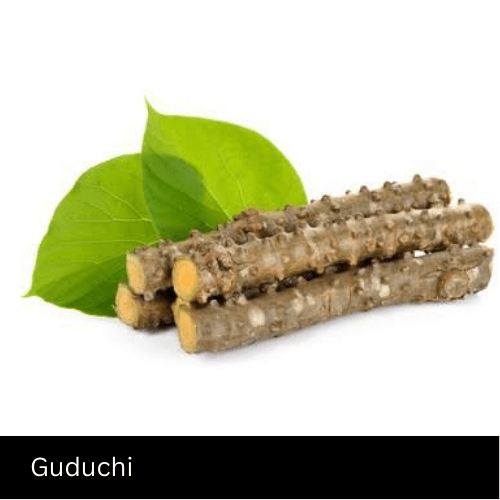About Guduchi / Tinospora Cordifolia
The plant is known for its immunomodulatory, antioxidant, and anti-inflammatory properties, which are attributed to the presence of several bioactive compounds, including alkaloids, glycosides, and steroids. It is commonly used to improve immunity, treat various infections, manage diabetes, and reduce stress and anxiety.
Some studies have also suggested that Guduchi may have potential therapeutic benefits in the treatment of cancer, liver diseases, and neurological disorders, although further research is needed to confirm these effects.
Guduchi can be consumed in various forms, including as a powder, extract, or capsule. It can also be brewed as a tea or added to various dishes. However, it is important to consult a healthcare professional before consuming Guduchi, particularly if you have any underlying medical conditions or are taking medications.
- Amrita (meaning “nectar of the gods”)
- Giloy (in Hindi)
- Gado (in Bengali)
- Tippa-teega (in Telugu)
- Shindilakodi (in Tamil)
- Heart-leaved moonseed (in English)
In Ayurveda, Guduchi is also known by its Sanskrit name, which is “Tinospora Cordifolia” or “Amrita”.
-
Boosts Immunity: Guduchi has been traditionally used to improve immunity and help fight infections due to its immunomodulatory properties.
-
Acts as an Antioxidant: Guduchi contains several antioxidants that help protect against oxidative stress and reduce inflammation.
-
Helps Manage Diabetes: Guduchi may help regulate blood sugar levels by improving insulin sensitivity and reducing blood glucose levels.
-
Supports Liver Health: Guduchi is believed to support liver health by improving liver function, reducing inflammation, and protecting against liver damage.
-
Improves Digestive Health: Guduchi is traditionally used to improve digestion, relieve constipation, and reduce inflammation in the digestive system.
-
Reduces Stress and Anxiety: Guduchi has been found to have anxiolytic and anti-stress properties, which may help reduce stress and anxiety levels.
-
Supports Respiratory Health: Guduchi is traditionally used to improve respiratory health and reduce the symptoms of respiratory infections.
-
Helps Manage Arthritis: Guduchi may help reduce inflammation and pain associated with arthritis.
-
May Have Anti-Cancer Properties: Some studies suggest that Guduchi may have anti-cancer properties due to its ability to reduce inflammation and boost immunity.
-
May Improve Cognitive Function: Guduchi has been found to have neuroprotective properties that may help improve cognitive function and memory.
However, there are different forms in which Guduchi is available in the market, including:
-
Powder: Guduchi powder is made by grinding dried Guduchi stems and leaves.
-
Capsules: Guduchi capsules are made by filling Guduchi powder in capsules of different sizes.
-
Extracts: Guduchi extracts are made by extracting the bioactive compounds from the plant using solvents such as water, ethanol, or methanol.
-
Tea: Guduchi tea is made by boiling Guduchi stems and leaves in water.
-
Tablets: Guduchi tablets are made by compressing Guduchi powder into tablet form.
It is important to note that the effectiveness and dosage of Guduchi may vary depending on the form in which it is consumed. It is best to consult a healthcare professional before consuming Guduchi in any form, especially if you have any underlying medical conditions or are taking medications.
-
Alkaloids: Guduchi contains several alkaloids, including berberine, palmatine, and magnoflorine, which have antimicrobial, anti-inflammatory, and antioxidant properties.
-
Diterpenoid lactones: Guduchi contains diterpenoid lactones such as columbin and tinocordifolin, which have antipyretic, anti-inflammatory, and analgesic properties.
-
Polysaccharides: Guduchi contains several polysaccharides, including arabinogalactan, which has immunomodulatory properties.
-
Glycosides: Guduchi contains various glycosides, including syringin and syringaresinol, which have antioxidant and anti-inflammatory properties.
-
Phenolic compounds: Guduchi contains several phenolic compounds, including catechins, epicatechins, and rutin, which have antioxidant and anti-inflammatory properties.
-
Triterpenoids: Guduchi contains several triterpenoids, including tinosporone and tinosporic acid, which have anti-inflammatory, antipyretic, and antiallergic properties.
These bioactive compounds are believed to be responsible for the various health benefits associated with Guduchi. However, more research is needed to fully understand the mechanisms of action and potential therapeutic applications of these compounds.

